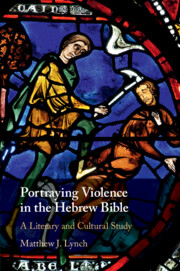Book contents
- Portraying Violence in the Hebrew Bible
- Portraying Violence in the Hebrew Bible
- Copyright page
- Publisher’s note
- Dedication
- Contents
- Acknowledgements
- Abbreviations
- Introduction
- Part I Violence and Ecology
- Part II Violence and Moral Speech
- Part III Violence and Justice
- Part IV Violence and Impurity
- Conclusion
- Appendix
- Bibliography
- Index
Part II - Violence and Moral Speech
Published online by Cambridge University Press: 06 May 2020
- Portraying Violence in the Hebrew Bible
- Portraying Violence in the Hebrew Bible
- Copyright page
- Publisher’s note
- Dedication
- Contents
- Acknowledgements
- Abbreviations
- Introduction
- Part I Violence and Ecology
- Part II Violence and Moral Speech
- Part III Violence and Justice
- Part IV Violence and Impurity
- Conclusion
- Appendix
- Bibliography
- Index
Summary
Thus far we have focused on an ecological grammar of violence, but there are other ways we can examine biblical conceptions of the problem of violence. Some are less cosmic in scope, and focus more specifically on the ways that violence stems from flaws in one’s speech, a topic that finds frequent mention in biblical discussions of moral character. ‘Those who seek my life speak destruction’, says the psalmist; ‘They murmur treacheries all day long.’ The Hebrew Bible offers a rich variety of expression about the relationship between one’s moral character and violence. By moral character, I refer to the ‘sum and range of specifically ethical qualities or traits the individual or community possesses’.1 Concerns about moral character vary across biblical literature, and are arranged according to particular cultural priorities. Anne Stewart rightly contends that ‘the concept of character displays certain values that a society privileges and its assumptions about what it means to be human’. It follows that ‘the study of character is inevitably a study of the larger moral culture in which it is rooted’.2 Attending to the varied grammar of moral character will involve analysis of the ways that different authors organize their moral worlds. Particular moral values will step into the foreground in some bodies of literature, and recede in others. Moreover, those values concerning violence will be arranged in relation to other values in specific ways, just as the values of freedom and equality might take centre stage in contemporary American culture, and become intrinsically linked. Those ways of organizing the moral world are widely varied within the Hebrew Bible, and attention to the nuances of each biblical genre is beyond the pale of this study. For our purposes, we will take a selection of texts from several biblical genres, with a focus on the presentation of moral character in Proverbs, and related presentations in Psalms.
- Type
- Chapter
- Information
- Portraying Violence in the Hebrew BibleA Literary and Cultural Study, pp. 95 - 144Publisher: Cambridge University PressPrint publication year: 2020

